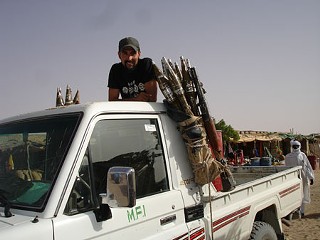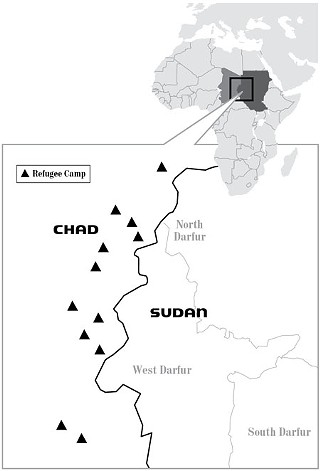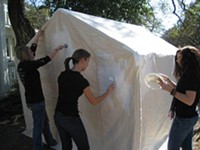Dispatches From Darfur
Austinites Rio Tenango and Leah Pries take their activism, and their aliases, all the way to Africa
By Richard Whittaker, Fri., July 11, 2008

Darfur. The U.S. government calls it the scene of genocide. The U.N. estimates 400,000 people have been slaughtered, and three times that many are refugees. Luis Moreno-Ocampo, chief prosecutor for the International Criminal Court, has called the entire region "a crime scene."
So what is an Austin-based wildlife control expert doing trying to fix this bloodbath?
"We've been asked, 'How'd you go from pest guy to brokering deals with rebel groups?'" said Rio Tenango, a former youth pastor and wilderness tour guide who legally changed his name in 2000 after noticing that tour participants "responded more effectively to commands from Rio than Derek, my birth-given name." Tenango and his wife, Leah Pries, spent the late Nineties raising and transporting commercial donations for orphanages in Eastern Europe and Guatemala. In 2003, the couple turned their attention to the genocide in the Republic of Sudan, the home of a roiling series of civil wars between the Sudanese government in Khartoum and 50 rebel and militia groups that varyingly support and oppose the Khartoum regime. Many refugees have fled to neighboring Chad, where the conflict has followed them. After witnessing the systemic failures after Hurricane Katrina in New Orleans, where Tenango and Pries assisted survivors, the couple applied those lessons to sub-Saharan Africa. "We thought, maybe this thing's still going on, not because the bad guys are so horrible, but maybe the system's not set up to solve conflicts. So we switched our mindset from 'humanitarian' to 'activism.'"
The first step was to get to the region, start researching, and start reporting, so the international community could understand the conflict better. Tenango and Pries adopted pseudonyms – the "Peace Pipe Repairman" and "Kitten" – so they could more safely send video communiqués to the world via YouTube. Before traveling, they met with experts on the conflict, including former U.S. Rep. Harry Johnston, who served as President Bill Clinton's special envoy to Sudan from 1998 to 2000. Impressed by Tenango and Pries, Johnston called them "very sincere and, most importantly, very patient." While in Chad, Tenango kept in contact with Johnston for advice on dealing with the Chadian government and traveling safely. "Of course, it was easier for me, because I went with the CIA," said Johnston.

Tenango and Pries flew to Chad on March 31 as reporters with a video permit issued by the Chadian government. Once there, they traveled to United Nations refugee camps with staff from the Office of the U.N. High Commissioner for Refugees and the World Food Programme, and met with leaders of the main anti-Khartoum rebel group, the Justice and Equality Movement. "In terms of logistics, you really need the support of the U.N. to get in there," said UNHCR spokesman Tim Irwin. But even traveling under U.N. colors is not a guarantee of safety. Carjacking of aid trucks is common, said Irwin, "and sometimes we've had to evacuate offices and nonessential staff."
After receiving death threats from pro-Khartoum forces, Pries returned to the U.S. on May 19; Tenango stayed for another month, learning to sleep with a bulletproof vest for a blanket. "I spent one night hiding behind a door with a knife," he said. What he found in Sudan was a hamstrung international response: U.N. forces bound by rules of engagement requiring them to tell Khartoum when and where they're patrolling, few journalists on the ground – meaning coverage is dangerously incomplete – and humanitarian groups fearful that highlighting the situation will get them expelled (on June 25, the Sudanese government expelled Banu Altunbas, director of Médecins Sans Frontières Holland's Darfur mission). "When the press says, 'Rebels attacked a camp,' they don't say which rebel group that was because they don't have the experience," he said. So he started forwarding his communiqués to the U.N., to U.S. politicians, to the press, to anyone that would listen.
Having been on the ground, Tenango supports international involvement but not an invasion. "If you had regime change in Sudan, if the West went in blasting, you would have instant civil war," he said. His solution is not to make Sudan the next Iraq but to learn the lessons from Yugoslavia, where the international community used war crimes trials to help end a seemingly insoluble conflict. The International Criminal Court, the court of last resort for the most grievous crimes against humanity, has already issued arrest warrants for two alleged war criminals: Ahmad Muhammad Harun, Sudan's minister of state for humanitarian affairs ("There's a whole other story of irony," said Tenango about Harun's title), and Janjaweed militia leader Ali Muhammad Ali Abd-Al-Rahman. Tenango has formulated a list of four more names: Sudanese President Omar Hassan Ahmed Al-Bashir; Al-Bashir's vice president, Ali Osman Taha; Sudanese Liberation Army Cmdr. Minni Minnawi; and Janjaweed Cmdr. Musa Hilal. Tenango calls them all together the Sudanese Six and has forwarded the list to the ICC. "I was praying, please God, let them indict these guys. It just so happened that on May 30, the ICC did tell the Security Council that they have a new roster of names to indict for war crimes in Sudan." In his semiannual report to the U.N. Security Council, Moreno-Ocampo confirmed that he will release the new names this month. This announcement had a downside for Tenango: He could show the rebels that the international community was still paying attention to Darfur, but now he seemed a little too well-informed. "They thought I was CIA," he said.
While he has had confirmation that the ICC has received his communiqués, Tenango doesn't claim the announcement was his victory. But he does see this as an opportunity to bring international attention and public support to the ICC's efforts. He hopes Moreno-Ocampo avoids mass indictments and instead adds just those four names. "Take out those guys, through the ICC indicting them rather than through assassination, and have a conditional offering of impunity for the rest," said Tenango. The condition? "We're not going to arrest you guys if you help us arrest these guys." While there are thousands who could and maybe should be prosecuted, Tenango believes this representative selection would send a clear message that the ICC means business. Plus, after five years of bloodshed, "The Sudanese army are tired of war; the civilians are tired of it, the refugees, the rebels, everyone," he said.
For real change, Tenango argues, there needs to be informed global grassroots support. If the ICC hands down indictments without popular American backing and cannot ensure continued Sudanese oil production – 80% of which goes to China, which holds an all-important U.N. Security Council veto – then nothing will happen. "If the little people, the citizens, are saying indict the Sudanese Six," he said, "there's a chance that peace in the Sudan could really happen."
For more information and the full Sudan communiqués, visit www.youtube.com/user/peacepiperepairman.
Got something to say on the subject? Send a letter to the editor.










